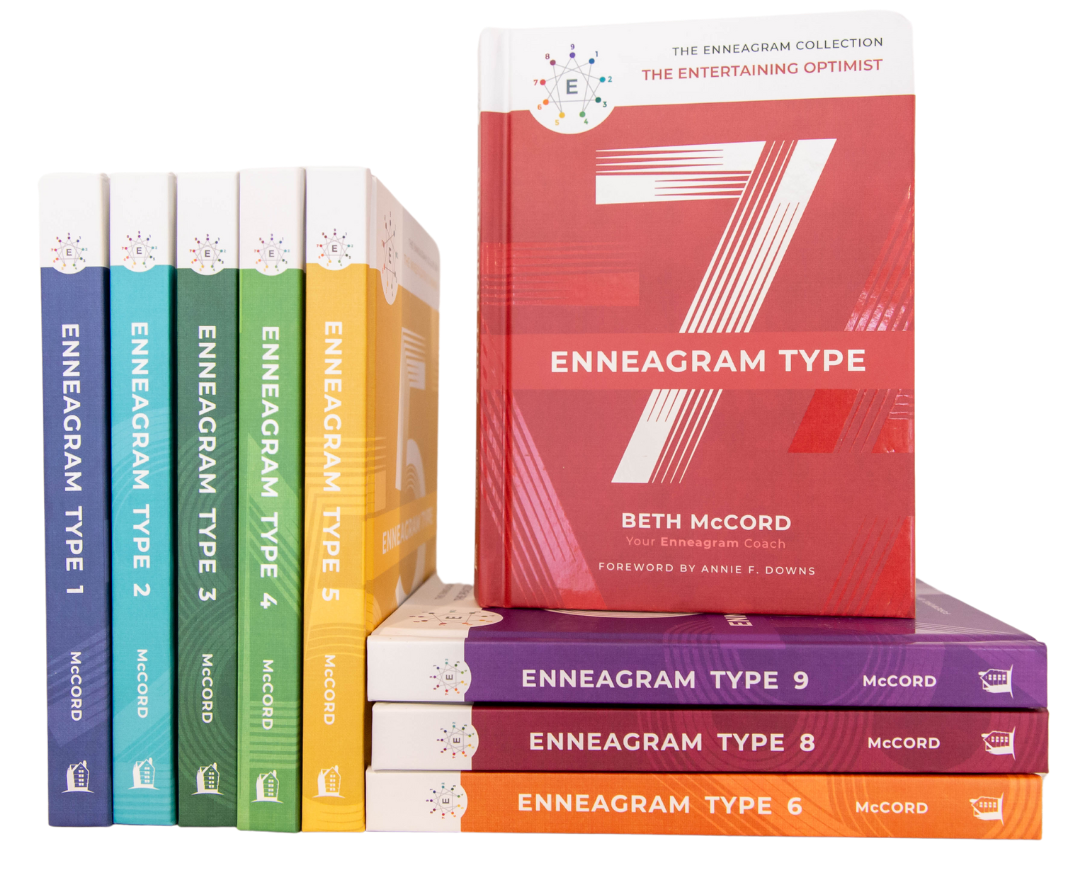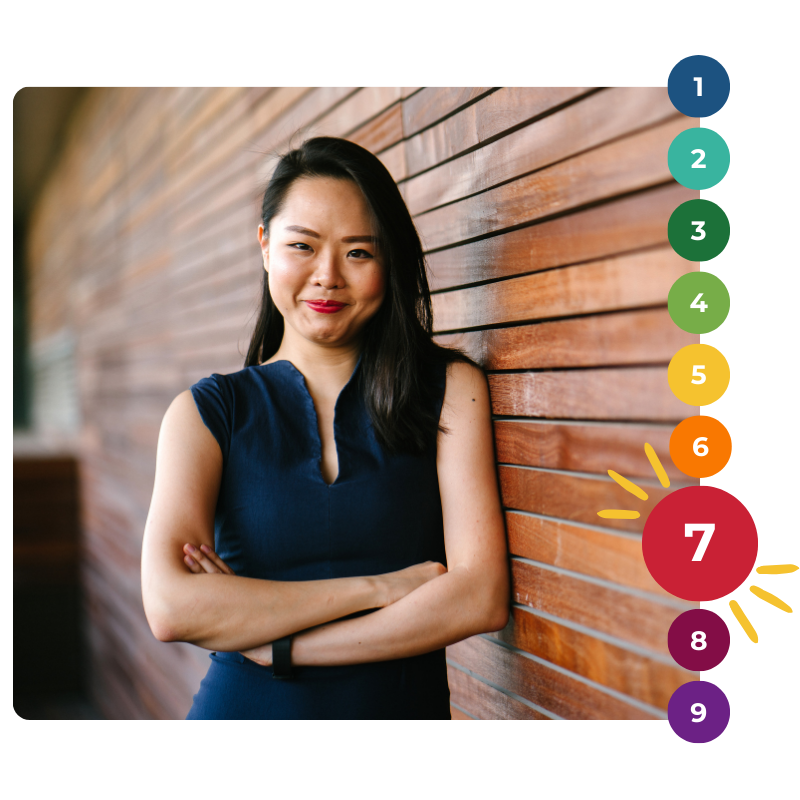Enneagram Type 7
The Enthusiastic Optimist
Playful | Excitable | Versatile | Scattered | Escapist | Entertaining
Enneagram Type 7
Summary
Type 7s are joyful, enthusiastic, and social individuals who radiate optimism wherever they go. They see endless possibilities and thrive on adventure and excitement.
However, beneath their positivity, they constantly long for more and fear missing out. Life can feel like cotton candy—sweet but fleeting, leaving them unsatisfied and always chasing the next thrill.
When faced with pain, boredom, or difficult emotions, they instinctively seek distraction through stimulating experiences, avoiding discomfort rather than processing it.
This tendency can make them scattered, uncommitted, and unreliable in relationships, as they prioritize excitement over emotional depth. Their avoidance of hard emotions can hinder true connection, as deep relationships require facing life’s challenges rather than escaping them.


Enneagram Type 7
Core Motivations
The four Core Motivations are the driving forces behind why each type thinks, feels, and behaves in particular ways.
Core Fear
Being deprived, trapped in emotional pain, limited, or bored, missing out on something fun.
Core Desire
Being happy, fully satisfied, and content.
Core Weakness
Gluttony - Feeling a great emptiness inside and having an insatiable desire to "fill yourself up" with experiences and stimulation in hopes of feeling completely satisfied and content.
Core Longing
“You will be taken care of."
🎥 Watch:
Beth McCord Discusses Type Seven
Enneagram Type 7
📊 Levels of Health

We all move fluidly through the Levels of Alignment. Day by day, we shift up and down the levels depending on how we respond to life’s blessings and challenges.
At our healthiest, we live with a sense of purpose and clarity, serving others with integrity and compassion. However, when we begin to feel the weight of life’s pressures, we may slip into autopilot, believing we need to control everything ourselves. In the most challenging times, we lose touch with our sense of stability and behave as if we are entirely on our own, striving to cope in unhealthy ways.
The encouraging news is that these shifts are part of the human experience. With growing self-awareness and gentle persistence, we can bring ourselves back to a healthier, more balanced place—one where we’re rooted in clarity, integrity, and compassion.
✅
ALIGNED
Healthy Type 7
✅ Staying present and fully enjoying life’s moments, leading to a deep sense of gratitude and contentment.
✅ Facing sadness and disappointment with resilience rather than avoiding them.
✅ Maintaining their playful and fun nature while also being grounded, focused, and responsible.
⚠️
MISALIGNED
Autopilot Type 7
⚠️ Rejecting or avoiding any form of pain, sadness, or disappointment.
⚠️ Seeking excitement and new experiences as a way to escape discomfort.
⚠️ Reframing or ignoring negative emotions instead of processing them.
⚠️ Struggling with focus, commitment, and following through on tasks.
❌
OUT OF ALIGNMENT
Unhealthy Type 7
❌ Becoming consumed with avoiding boredom or emotional discomfort at all costs.
❌ Blaming others for limiting their happiness while failing to recognize their own restless tendencies.
❌ Resisting any restrictions or responsibilities and chasing pleasure, even in harmful ways.
❌ Taking excessive risks, becoming reckless, and developing unhealthy coping mechanisms.

Enneagram Type 7
🧩 Enneagram Internal Profile (EIP)
Your main Enneagram type is the driving force behind why you think, feel, and behave the way you do—and it will always remain your primary type. However, it’s not the only influence shaping your life. The other Enneagram numbers connected to your type also play a significant role.
Have you ever faced a difficult decision and thought, “Part of me feels this is the right choice, but another part of me isn’t so sure”? These internal conflicts make more sense when you understand all the different parts of your heart.
To help you navigate these influences, we’ve developed the Enneagram Internal Profile (EIP). EIP helps you identify, map out, and name the key parts of your personality—including your wounded child part, beloved child part, wings, and arrows (or paths)—so you can better understand yourself and grow with clarity.
Keep reading to discover all the parts of Type 7 and how they shape your thoughts, feelings, and actions.
Enneagram Internal Profile (EIP) for Type 7
Wounded Child vs. Beloved Child
Sometimes, Type 7s operate from their Wounded Child ❤️🩹—the part of them that believes they must rely on themselves for happiness and excitement. As a child, they longed to hear, “You will be taken care of,” but instead, they felt their desires for fun and stimulation were unmet or dismissed. To avoid unpleasant experiences—whether boredom, punishment, or responsibility—they constantly sought out excitement, positivity, and new adventures. They learned to chase what made them feel happy and satisfied, believing they couldn’t depend on others to provide it.
On the other hand, Type 7s also have a Beloved Child ❤️—the part that knows they are already whole and don’t have to chase fulfillment elsewhere. When they operate from this place, they trust that they have enough, allowing them to slow down and savor life without fearing they’re missing out. Instead of constantly searching for the next big thrill, they find deep joy in the present moment. From this space, they can experience true contentment, knowing they are supported and don’t have to go it alone.

Want to dive deeper into Wounded Child, Beloved Child, and Enneagram Internal Profile (EIP)?
Learn About Your EIP
Enneagram Type 7
🪽Wings
For Type 7, the Wings are Type 6 and Type 8. Wings are the two Enneagram Types directly next to your Main Type on the Enneagram diagram. We naturally access traits from both wings in varying degrees depending on the situation. No matter how much we lean on these Wing influences, your core Type remains the guiding force behind our deepest motivations and perspectives. See if you can spot when each Wing shows up and influences the overall tone, perspective, and behaviors of your main Type.

Type 7 Wing 6 (7w6)
"The Entertainer"
- General Characteristics: The Entertainer is outgoing, playful, and full of creative energy. They thrive on fun, social connections, and shared experiences, bringing an infectious enthusiasm wherever they go. Unlike the more independent 7w8, Entertainers are more attuned to what others think and seek reassurance in their relationships. They value adventure but also appreciate having a trusted support system. More lighthearted and generous than the 7w8, they enjoy making people laugh and maintaining a high energy level in any situation.
- When Struggling: The anxieties of Type 6 can make them more scattered and restless, leading to impulsive decisions and difficulty focusing. To escape discomfort, they may seek out new experiences, relationships, or possessions as distractions. Their energy can become frenetic, making them appear fidgety or unable to settle. The tension between Type 7’s desire for excitement and Type 6’s need for security can leave them feeling torn between chasing freedom and seeking stability.
- Inspiring Quality: Entertainers bring joy, passion, and loyalty to their relationships. They are fun-loving and engaging, yet deeply committed friends who want to create meaningful memories with others.

Type 7 Wing 8 (7w8)
"The Realist"
- General Characteristics: The Realist is assertive, ambitious, and energetic, blending the adventurous spirit of Type 7 with the confidence and intensity of Type 8. They are natural go-getters who push boundaries and take risks, caring less about approval than their 7w6 counterparts. With a strategic mindset and strong willpower, they know how to make things happen and won’t back down from a challenge. Their boldness makes them natural leaders, and they are quick to take charge in any situation.
- When Struggling: Their relentless drive can turn into workaholism, restlessness, and an insatiable need for stimulation. They may become demanding, controlling, and aggressive if obstacles get in their way. Their thrill-seeking tendencies can lead to reckless behavior, and they may struggle to slow down or acknowledge their emotional needs. The combination of Type 7’s avoidance of pain and Type 8’s resistance to vulnerability can make it difficult for them to process deeper emotions.
- Inspiring Quality: Realists are confident and resilient, seeing setbacks as opportunities to learn and grow. Their persistence, adaptability, and innovative mindset make them unstoppable in pursuing their goals.
Enneagram Type 7
🧭 Arrows
The Enneagram Arrows are the inner lines and arrows inside the diagram that connect each main type to its associated paths. These connections show how each type may move toward growth or struggle depending on life circumstances and their response to challenges.
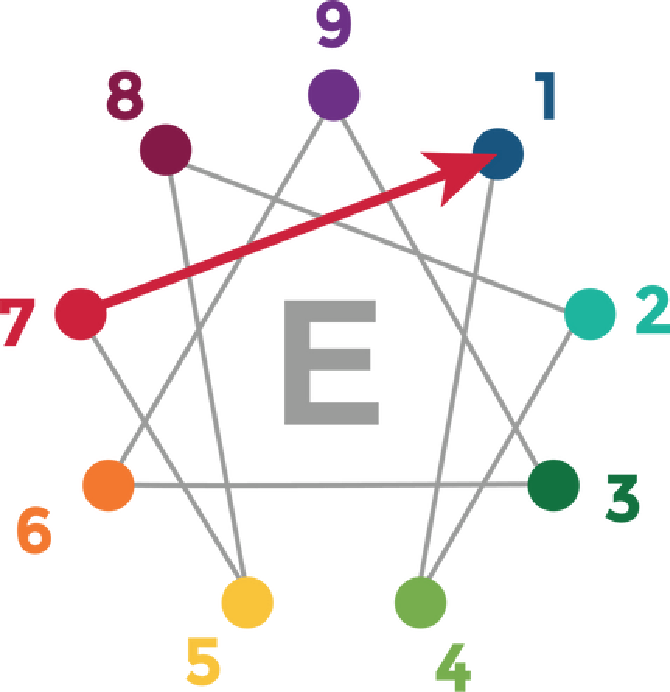
😫 Stress Arrow
Type 7 moves toward Average to Unhealthy Type 1
The thoughts, emotions, and behaviors you experience when you are under stress.
- Impose strict rules on themselves to become more productive.
- Become irritable and overly critical of themselves.
- Fixate on flaws in themselves, others, and their environment.
- Develop perfectionistic tendencies, expecting others to meet high standards.
- Get frustrated with those who disrupt their plans for fun.
- Micromanage people they see as irresponsible.
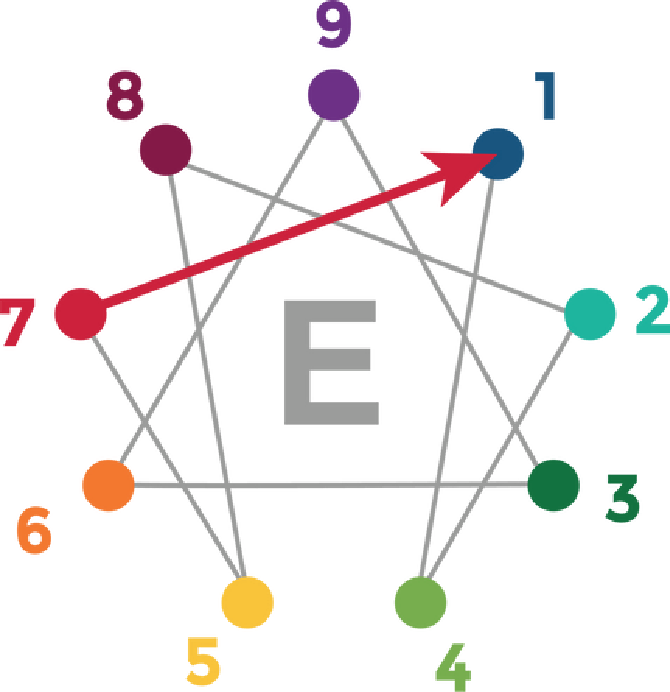
Converging Arrow 💪
Type 7 moves toward Healthy Type 1
As you continue to grow, you can reach a point where you access the healthiest qualities from the Type in your Stress Path.
- Accept life as it is rather than chasing endless new experiences.
- Prioritize tasks and follow through without distraction.
- Approach work with care and accuracy, completing it with excellence.
- Slow down, take their time, and ensure things are done well.
- Take responsibility for obligations, even when they aren’t exciting.
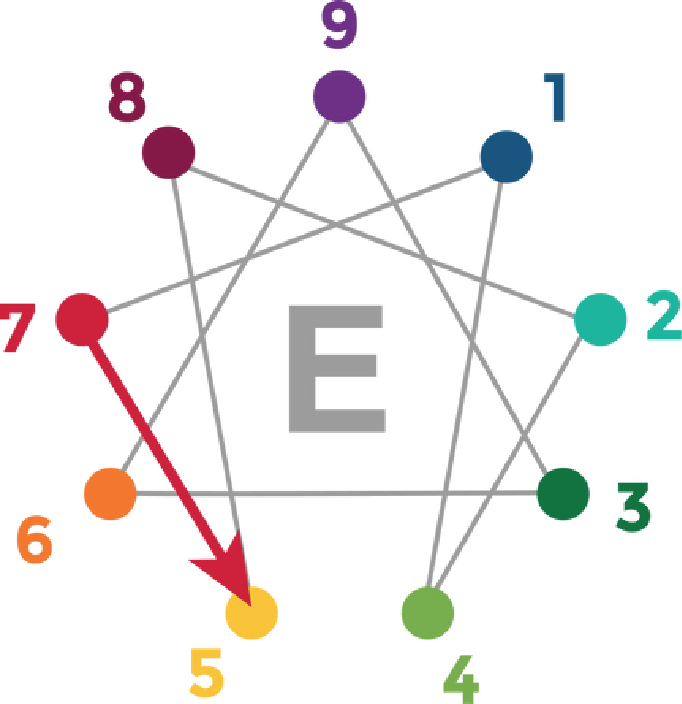
🫣 Blind Spot Arrow
Type 7 moves toward Average to Unhealthy Type 5
Less healthy behaviors that happen mainly around your family.
- Withdraw from social interactions to recharge.
- Feel drained from constantly maintaining a positive attitude.
- Conserve energy by becoming more reserved and observant.
- Experience a growing dissatisfaction with their life.
- Develop a darker, more cynical, and pessimistic outlook.
- Struggle to trust others and prefer solitude.
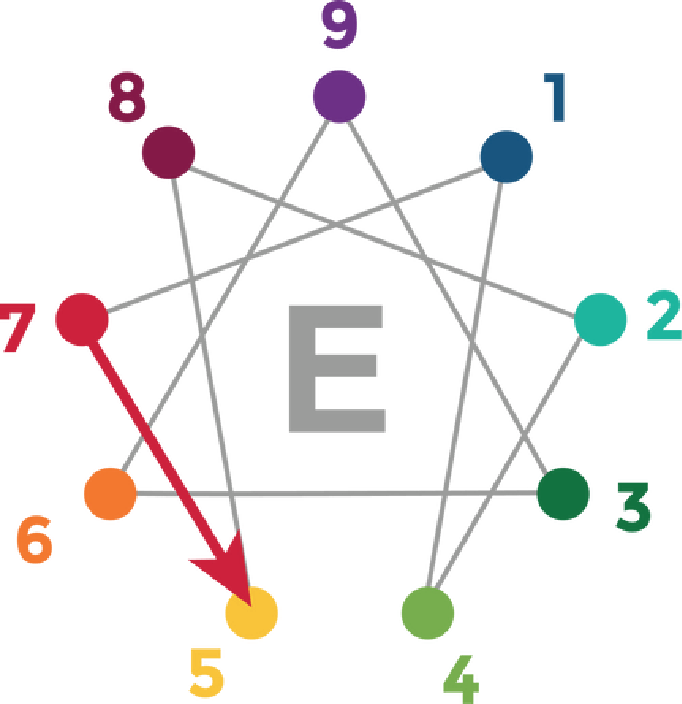
Growth Arrow 🌱
Type 7 moves toward Healthy Type 5
The attributes you display and experience while you are growing.
- Turn inward and learn to relax without constant stimulation.
- Allow their quick mind to slow down, leading to deeper clarity and insight.
- Channel their energy into meaningful work with more structure and organization.
- Become more grounded, focused, and thoughtful.
- Value wisdom, discipline, and learning over constant excitement.
- Embrace life in its fullness—both the highs and the lows.
Enneagram Type 7 in Relationships 👫
Type 7s bring an exciting, spontaneous energy to relationships. Their enthusiasm for life is contagious, and they love sharing new experiences with a partner. For those who are more reserved, being with a Type 7 can feel like a refreshing adventure, full of surprises, laughter, and endless possibilities. They are generous, open-minded, and always looking for the next great experience to enjoy together.
However, the same high-energy approach that draws people to them can also create challenges. Their partners may feel overwhelmed by the constant activity or struggle to keep up with their fast-paced lifestyle. At times, Type 7s may prioritize excitement over emotional depth, making it difficult for their partner to feel truly seen and heard.
💔 Relationship Challenges
- Talking Over Others – They often dominate conversations, making the relationship feel one-sided.
- Impatience – They get frustrated with slower-paced partners or routine commitments.
- Escapism – Avoiding difficult conversations or emotions by focusing on distractions.
- Fear of Vulnerability – Worry that being down or struggling will drive others away.
- Immediate Gratification – Expecting their partner to match their desire for instant excitement and pleasure.
💗 Relationship Strengths
- Fun & Adventurous – They bring joy, spontaneity, and excitement to relationships.
- Generous & Open-Hearted – They love sharing experiences and making their partner feel included.
- Optimistic & Inspiring – They uplift their partner with their enthusiasm for life.
- Creative & Engaging – Their curiosity keeps the relationship interesting and full of new ideas.
- Loyal & Committed (When Ready) – While they may struggle with commitment, when they choose a partner, they bring passion and energy into making the relationship fulfilling.
💌 Relationship Values for Type 7
- What They Look For: Pleasure, fun, stimulation, adventure, excitement, and variety.
- What Gets in the Way: Difficulty committing long-term, avoiding emotional depth, and expecting their partner to keep up with their fast-paced lifestyle. They may use their upbeat nature as a way to manipulate or insist on getting their way.
Enneagram Type 7
Relationship Dynamics / Pairing 🫶
Discover how Type 7 interacts with each Enneagram type—their unique dynamics, strengths, challenges, and how to grow together.
TYPE 7 & TYPE 1
TYPE 7 & TYPE 2
TYPE 7 & TYPE 3
TYPE 7 & TYPE 4
TYPE 7 & TYPE 5
TYPE 7 & TYPE 6
TYPE 7 & TYPE 7
TYPE 7 & TYPE 8
TYPE 7 & TYPE 9
👶 Enneagram Type 7 As Children
Childhood Patterns
♥️ Type 7 children often feel emotionally cut off and neglected by the parent or caregiver who is meant to nurture them. This leads them to believe they must rely solely on themselves to meet their needs.
♥️ Early on, they internalize the message that their happiness and satisfaction depend on their own efforts, causing them to create a world full of distractions to escape any painful emotions.
♥️ They seek constant excitement and adventure to fill the emptiness they feel inside, using toys, games, and even humor to avoid uncomfortable feelings.
Childhood Messages
💬 Internalized Message:
Type 7 children often receive the message—whether directly or indirectly—that they cannot rely on others for support and must take care of themselves. This shapes their belief that happiness and fulfillment must come from within.
❤️ Heart’s Longing:
What Type 7 children longed to hear but often did not fully receive from their caregivers was: “You will be taken care of.” This longing still echoes in their hearts as they search for contentment outside of themselves, often without realizing that true fulfillment can only come from within.
Enneagram Type 7
📈 Personal Growth Steps

Embrace Stillness: Set aside regular time to slow down and reflect on your thoughts. Type 7s often rush to fill their lives with excitement, but taking moments of quiet to process feelings and anxieties will help cultivate a sense of peace and satisfaction.

Surrender Control: Let go of the need to constantly seek new experiences for joy. Acknowledge when you are seeking external stimulation to avoid discomfort, and practice surrendering those anxieties and distractions to focus on what truly brings fulfillment.

Cultivate Presence: Work on being fully present in the moment. Type 7s tend to get caught up in planning the next adventure, but investing in what’s happening now can lead to deeper joy and contentment. Focus on relationships and experiences that truly nourish you.

Practice Active Listening: Make sure to balance conversations by actively listening to others. This will allow you to be present with people and show them that you care, making them feel heard and appreciated rather than always focusing on your own excitement or ideas.

Seek Meaningful Guidance: Find a coach, counselor, or mentor who can help you explore your desire for constant excitement and find more sustainable sources of joy. They can guide you in developing deeper emotional awareness and learning how to fully embrace life without escaping discomfort.

Find Fulfillment in Simplicity: Take a moment to appreciate the simple joys that surround you. Instead of seeking external experiences for happiness, practice savoring the life and blessings you already have, fostering gratitude for the present.
Enneagram Type 7
🤔 Misidentifications
Still not entirely sure if you’re a Type 7 or just have some Type 7 traits?
Here is a comparison of Type 7 with all the other Enneagram types to help you figure it out.
TYPE 7 & TYPE 1
TYPE 7 & TYPE 2
TYPE 7 & TYPE 3
TYPE 7 & TYPE 4
TYPE 7 & TYPE 5
TYPE 7 & TYPE 6
TYPE 7 & TYPE 8
TYPE 7 & TYPE 9

Explore the complete mistyping list and see the key differences between all nine types in one place - download our free mistyping guide PDF!
Get The Guide

